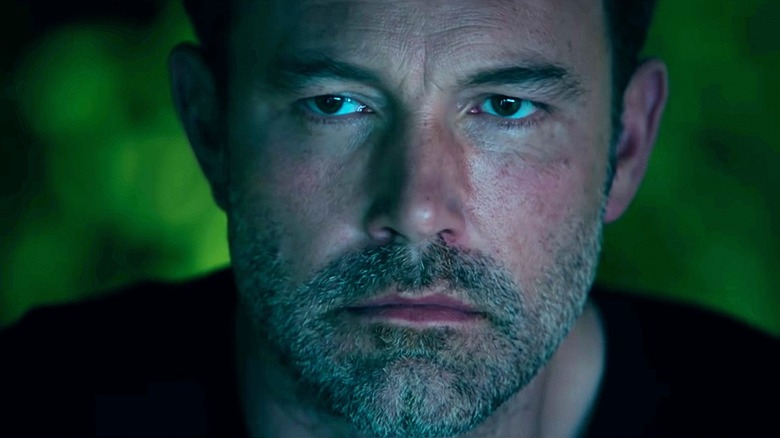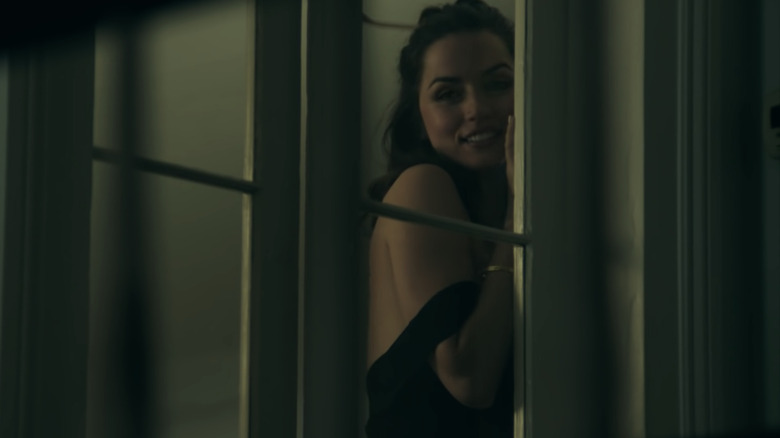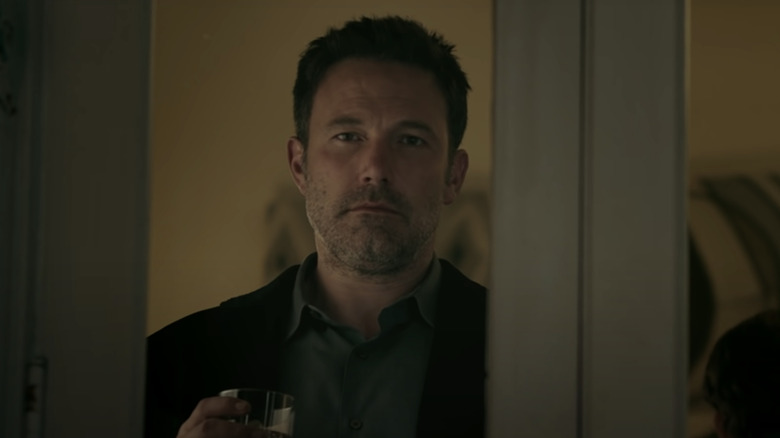Deep Water Ending Explained: Keeping Up With The Van Allens
After 20 years, Adrian Lyne has finally made his return to filmmaking, and he makes that return with a genre that is his bread and butter: the erotic thriller. "Deep Water," starring Ben Affleck and Ana de Armas, was sadly dumped on Hulu, avoiding a theatrical release altogether, but that says more about the sorry state of theatrical moviegoing than it does the film. While not up there with Lyne's best work, "Deep Water" offers plenty of salacious fun and features a wickedly wonderful Ben Affleck performance. One might think "Deep Water" being made 20 years after Lyne's previous film "Unfaithful" might find the filmmaker a little creaky, but he is still as engaged as a director as ever, even if some of the grander visual panache of his early work is missing here. Lyne's concerns as a storyteller remain firmly intact, though, and "Deep Water" fits right alongside the rest of his work perfectly.
In fact, this marks the third film an unofficial trilogy for the British filmmaker all concerning men who do not know how to handle themselves when their wives cheat on them. First was "Indecent Proposal," where Robert Redford's billionaire character offers the happily married (but financially struggling) couple of Demi Moore and Woody Harrelson $1 million for a night with Moore. Then there is "Unfaithful," in which Diane Lane cheats on her husband (Richard Gere) with a hunky bookseller. Harrelson and Gere in those two films play basically normal, everyday guys who just do not know how to compute the fact that their partners could have had sex with another person. Their jealousies consume them, with Harrelson lashing out in anger and Gere killing his wife's lover. Both films do offer a glimmer of hope that these relationships could continue after the tumult.
"Deep Water" takes the idea of the cuckolded husband and complicates him much more than the previous two films. While the jilted, jealous man with rage is certainly to be found in Affleck's Vic Van Allen, there are whole other facets to him that simultaneously make him more and less sympathetic to the audience than these other men. They also muddy up the central marriage with de Armas' Melinda even more, leaving you unsure if these two people should never see each other again or they were perfectly made for one another.
To be horny or not to be horny
Woody Harrelson and Richard Gere's characters are driven by complete sexual insecurity. Harrelson, in particular, keeps screaming at Demi Moore about whether or not she thought Redford was good in bed. This is a pretty common trope for the jilted husband. A lot of men love to think that their cocksmanship could topple regimes and cure world hunger, and if someone comes to challenge that, they must be defeated. It makes these men sick to think that they may not be the best lover, the only one this woman could ever want.
Ben Affleck's rage at the men that Ana de Armas sleeps with over the course of the film does not seem built on penis envy. Not really. Sure, it's a small part, but the real threat he feels concerned about is love. The Van Allens have this unspoken agreement of sorts where they will not get a divorce if de Armas' Melinda can sleep with basically whoever she wants. Vic knows this is part of the game. It is when these men get too close that his violent side comes out. Melinda decides to get bold and starts bringing her lovers to social parties or family dinners, with one even discussing the possibility of her moving out of the country with him. This level of connection Affleck's Vic cannot stand, and that is what drives him to murder all of these guys.
Where the major divergence occurs with Vic and the other two Adrian Lyne men is Vic actually loves that his wife cheats on him. And by "loves," I mean is incredibly turned on by it. Again, they have essentially agreed for him to be a cuckold, and he cannot help himself spying in on his wife and whatever guy she's with in intimate moments. He knows exactly what is happening anyway, yet he has to do some peeking. The scene explicitly calling out his horniness for the whole thing is when her piano player boyfriend plays a tune at a party, and she grinds herself on Vic's crotch as they watch him play. Disregard the violent love jealousy part, the sexual component of their marriage may be unusual for a fairly mainstream movie, but it is an agreement so many couples have made with one another in real life. If everyone is on board, cuckolding and voyeurism are perfectly fine kinks to utilize in your sex life. That's why Vic can be completely turned on by his wife sleeping with other guys, but overstepping the boundary to where it is more than sex is when the trouble starts.
A sinister arrangement
While de Armas' Melinda is certainly suspicious that Vic has been the one making her boyfriends disappear, whether that be just by intimidating them to leave town or killing them, it is not until she finds the wallet of one of them in his snail shack (he likes snails) that she finally knows the truth. Her initial belief that he is a murderer certainly freaks her out, but once she has concrete evidence of his crimes, it turns out she isn't as opposed to the notion as she once thought. The film ends with Melinda burning the wallet of the dead lover, presumably to go on living her life as she had been with Vic.
Now, not only is there the tacit agreement between the two about her sleeping with other men, but they have a second unspoken agreement on top of that where he gets to murder the other men after they get too close. She sees the killing as the ultimate expression of love, how he is willing to take another person's life just so he can be the only one to love her. In the twisted realm of the erotic thriller, this is a marital compromise. Similar to how Daniel Day-Lewis' Reynolds Woodcock and Vicky Krieps' Alma Elson in "Phantom Thread" end that film on a pact where sometimes she is just going to poison him to take him down a peg, an extreme relationship needs an extreme accommodation. So, for Vic and Melina Van Allen, they can still have a great marriage, just as long as the f***ing and the killing can continue.
Other filmmakers may play this to the hilt, but Lyne trusts the faces of Ben Affleck and Ana de Armas to convey all of this complicated, twisted logic, which they beautifully achieve. "Deep Water" may not operate at a sensationalist level, but the murky morality that Adrian Lyne plays with here is as thrilling as any outrageous sex sequence he would have put in one of his earlier films. By making Vic a sociopathic horn dog who loves his wife and Melinda a woman who learns she is as jumbled up as her husband, "Deep Water" takes a step beyond so many other erotic thrillers, which feel the need to deliver black and white justice to its characters for their actions. Here, the Van Allens can be the f***ed up couple they are, which is the only way "Deep Water" could have ended.


